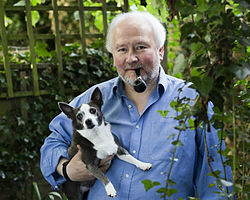
Back اندرو لينزى ARZ Andrew Linzey Catalan Andrew Linzey Czech Andrew Linzey German Andrew Linzey Spanish Andrew Linzey Finnish Andrew Linzey Italian Andrew Linzey Lithuanian Andrew Linzey Portuguese Линзи, Эндрю Russian
Andrew Linzey | |
|---|---|
 | |
| Born | 2 February 1952 |
| Children | Clair Linzey |
| Ecclesiastical career | |
| Religion | Christianity (Anglican) |
| Church | Church of England |
| Ordained | 1975[2] |
| Academic background | |
| Alma mater | King's College, London |
| Thesis | The neglected creature: the doctrine of the non-human and its relationship with the human in the thought of Karl Barth (1986) |
| Doctoral advisor | Colin Gunton |
| Influences | |
| Academic work | |
| Discipline | Theology |
| Sub-discipline | Animal ethics, Christian ethics |
| School or tradition | |
| Institutions | |
Andrew Linzey (born 2 February 1952) is an English Anglican priest, theologian, and prominent figure in Christian vegetarianism. He is a member of the Faculty of Theology at the University of Oxford, and held the world's first academic post in Ethics, Theology and Animal Welfare, the Bede Jarret Senior Research Fellowship at Blackfriars Hall.
Linzey is the founder and director of the Oxford Centre for Animal Ethics, an independent academic centre opened in November 2006 to promote the study and discussion of animal ethics.[6] He is the author of a number of books on animal rights, including Animal Rights: A Christian Perspective (1976), Christianity and the Rights of Animals (1987), Animal Theology (1994), and Why Animal Suffering Matters: Philosophy, Theology, and Practical Ethics (2009). He is also the editor of an academic journal, the Journal of Animal Ethics, which is published jointly by the Oxford Centre and the University of Illinois,[7] and a series editor with his daughter Clair Linzey, previously with Priscilla Cohn, of the Palgrave Macmillan Animal Ethics Series.[8]
- ^ Clarke, Paul Barry; Linzey, Andrew, eds. (1996). Dictionary of Ethics, Theology and Society. London: Routledge. p. xxii. ISBN 978-1-136-12100-5.
- ^ DeSilver, Drew (1990). "Serving the Lambs of God". Vegetarian Times. No. 149. Oak Park, Illinois: Vegetarian Life & Times. p. 59. ISSN 0164-8497. Retrieved 16 June 2019.
- ^ a b c d McLaughlin, Ryan Patrick (2014). Preservation and Protest: Theological Foundations for an Eco-Eschatological Ethics. Minneapolis, Minnesota: Fortress Press. p. 160. ISBN 978-1-4514-8040-5.
- ^ Frayne, Carl Tobias (2019). "Animals in Christian and Muslim Thought: Creatures, Creation, and Killing for Food". In Linzey, Andrew; Linzey, Clair (eds.). The Routledge Handbook of Religion and Animal Ethics. Abingdon, England: Routledge. p. 209. ISBN 978-0-429-48984-6.
- ^ McCarthy, Colman (25 December 1995). "Religion & the Treatment of God's Creatures". The Washington Post. Retrieved 16 June 2019.
- ^ "Welcome", "Advisers" Archived 2012-06-05 at the Wayback Machine, and "Honorary Fellows", Oxford Centre for Animal Ethics, accessed 25 May 2012.
- ^ Bingham, John. "Calling animals 'pets' is insulting, academics claim", The Daily Telegraph, 28 April 2011.
- ^ "The Palgrave Macmillan Animal Ethics Series". Springer. Retrieved 10 July 2020.